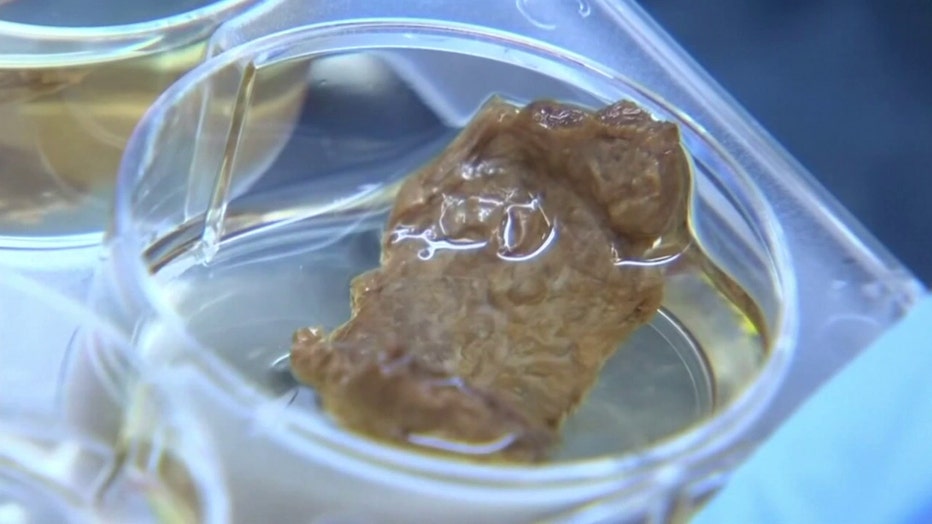Lab-grown meat ban bill moving through Florida legislature
TALLAHASSEE, Fla. - A bill sponsored by a Hillsborough County state lawmaker that would ban the cultivating or selling of lab-grown meat is moving through the Florida legislature.
The proposal is part of a larger, wide-ranging Department of Agriculture and Consumer Services bill, which was approved by the House Regulatory Reform and Economic Development Subcommittee last week.
"We're asking to slow down, pump the brakes," said Rep. Danny Alvarez, R-Hillsborough, who sponsored the bill (HB 1071), adding he's worried about any unknown potential long-term risks associated with cultivated meat. "We don't even know how it will affect our DNA or our biome. So, we just want to take a very soft and slow, methodical approach to make sure we're doing the right thing for the citizens of Florida."
READ: ADHD medication recalled because bottles may contain different drug that has opposite effect
The proposed ban is backed by Florida agricultural groups. The Senate Agriculture Committee has also begun moving forward with the Senate version (SB 1084).
Alvarez and other legislators disagree about whether his bill threatens the free market and is too short-sighted.

"In Florida, we have over 15,000 producers of homegrown cattle and beef that provide plenty for the state of Florida and is [available] into the foreseeable future. It's safe, it's sustainable, and heck, it's even green," Alvarez said Wednesday.
"My colleagues like to talk about the free market all the time, and yet here they are banning a product, because it threatens an established business, i.e. the cattle industry," Rep. Anna Eskamani, D-Orange County, countered. "The reality is not only should we be embracing new technologies and allowing this sector to have a footprint in Florida, but we also need to be proactive in addressing population growth and the fact that we don't have enough meat to sustain the population in this state and in this country for decades to come. And allowing there to be the production of alternative proteins is a good thing."
MORE: Do Stanley cups pose a lead poisoning risk? Here's what to know about online claims
Lab-grown meat is created by using just a few cells from an animal, which can grow into a sizable portion after several weeks. Federal regulators said some of it is safe and ready to eat after the FDA approved it last year.
USF Health Dr. John Sinnott has studied the process and said there are still some issues before it becomes readily available in the U.S.
"I think it will probably be two years till it arrives on the shelves," he said.
Dr. Sinnott told FOX 13 there are a few health concerns he'd like to see addressed.

"When you maintain cells in culture, there can be mutations that are unexpected, [people] could end up eating mutated meat, so to speak. There's no evidence for that. It hasn't happened, but it is a possibility," Dr. Sinnott said, adding he also had another question, which he believes scientists have sufficiently answered. "Are we going to get viruses from this cultured meat? And the more I looked, the less I think there's a risk."
READ: Robitussin cough syrup recalled nationwide due to microbial contamination
In the end, experts said the public will eventually decide whether cultivated meat will find its way onto dinner tables in Florida.
"The bottom line is I would try it if the price is right, if I trust the retailer," said Paul Sanson, who is visiting Tampa from Canada. "You can't stop progress. I mean, you got to try it."
"It's not natural and things are not natural, or they aren't meant to be put in our bodies," said Heidi Tomlinson, whose family is from the Midwest. "I think you can't ever get anything better than homegrown, grass-fed meat."
In a statement to FOX 13, a spokesperson for UPSIDE Foods, one of the companies in California that's producing lab-grown meat, wrote:
"UPSIDE strongly opposes the proposed bill aiming to criminalize cultivated meat in Florida, as it threatens the free market, stifles innovation, and limits consumer choice. This legislation not only jeopardizes the United States' leadership in biotechnology and Florida’s supply chain, it also hinders our ability to address the projected doubling of global meat demand by 2050. Importantly, cultivated meat is regulated by the FDA and USDA and is subject to the same oversight as conventionally-produced meat. Our opposition extends beyond our industry; even members of the conventional meat sector stand against it. We urge policymakers to reconsider, recognizing the broader consequences on the economy, innovation, and consumer freedom in Florida."


